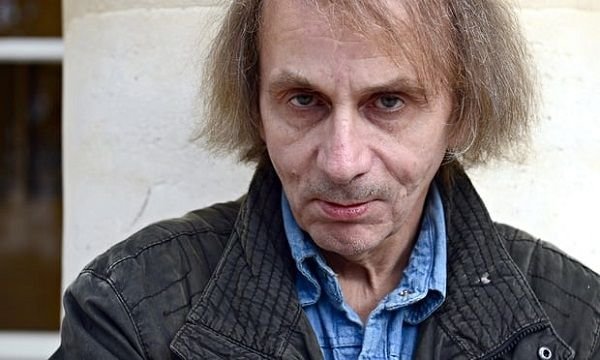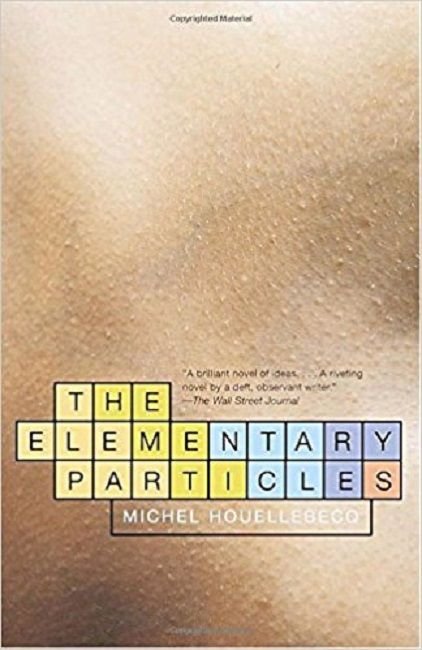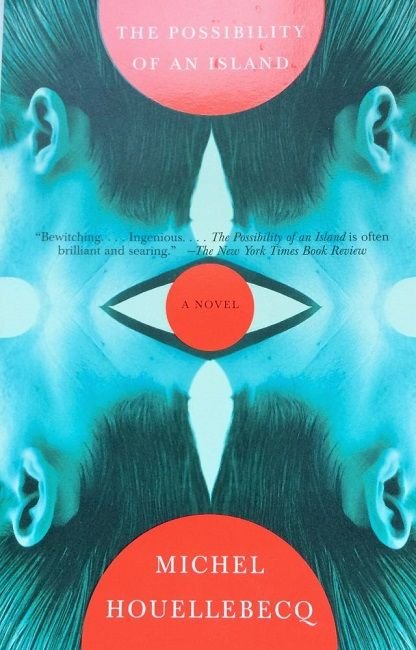
My acquaintance with one of the most scandalous and commented contemporary French writers began with his novel "The Possibility of an Island". Even though I read his other books shortly thereafter, I kept my attachment to this one, because I found it in the purest form of the two leading themes at Michel Houellebecq - the breakdown of the personality under the impossibility of loneliness and possible scenarios for the future of the human race. The opportunity for an island impresses with the most sincere description of the loneliness I have encountered, the man losing everything that may have been close to his heart at one point and the same man, naked and lonely facing the abyss of infinity in his existence.
In all his novels, Houellebecq puts a lone middle-aged man, usually not having any special qualities, in an ordinary or hostile environment, and just pushes PLAY to see where he will go in his attempts to continue somewhat of a lifetime your way. As we comprehensively follow the failures and the troubles of the character we can hardly sympathize with, our eyes actually reveal the big picture of a collapsing society, a suicidal world and its likely finals or sequels. The wider field of struggle, which hints at the first book of Houellebecq, appears to be too narrow or perhaps too broad for an anonymous programmer whose first-person narrative is the novel to succeed in finding his place in it, finishing with his personal end and leaving this world full of boredom and despair. Serious existential themes enter the Elementary Particles. Here, the boring, impersonal character Bruno is complemented by his alter ego, his brother, the scientist Michel. While the former spends his youth in trembling with food, and the maturity in the hopeless search for sex, the second, completely disinterested in the earthly pleasures, tries to understand the nature of being and eventually bring it to a purer form devoid of the negatives of our human passions. According to some critics, the elementary particles of the title have to be interpreted as the totally opposite Bruno and Michelle, the polarities of the contemporary Western man - extremely desperate and unsatisfied, or entirely intellectualized, but who, in both cases, is incapable of normal and profound human relationships. less love.
Still, while the mediocre bureaucrat is totally useless for both society and its closest friends, Michelle, who has a similarly personal life (a woman who really loves him and to whom he is incapable of giving anything) , manages to change the course of history and create a new world in which feelings will be unnecessary and life will be brought to a higher level of seamless existence. The idea of a new human race that will live calmly and contemptuously, without hatred, but without love. Of all the possible exits that Houellebecq offers in his novels about the collapsing western civilization, this seems to be the most promising, but in its development in Island Possibility, and he is under the test of time. Bruno and Michel of the Elementary Particles are merging into a common image in the Platform, again called Michelle, a once again bored clerk without any special talents and qualities except his recently inherited wealth from his father, allowing him to break away from his pointless monotonous routine and take a trip to exotic Thailand. When Houellebecq confronts two ideas about the future or two current cultures, it does not take any side of anyone's benefit and gives us the equally hopeless opportunities to waste our lives. If in the previous and the next novel these are the current rotten reality of holistic individualism and loneliness and the impassive future, in the Platform and Submission the same hollow and impotent Western individualism is compared with the rude but active and fertile reality of Islam and the East. Still, the European Michelle, who wants to take advantage of the easy joys of the developing world, is not prepared for the price of clash between cultures.

In the historical sequence of the Houellebecq novels, the most striking is the Island's Possibility. Here, through the character of comedian Daniel, criticism is subject to all that Houellebecq also addresses in his previous novels - the cruelty of the young, the inability of the old, the decline of the West, the fall of organized religions, the illusion of the poor and the boredom of the rich; among all this, the possibility of everlasting life without dramatic lust emerges here, albeit in a postcaplictic world. The only opportunity for an island is given in love, unreachable in the present and impossible in the future. At first glance, Map and territory, which earns Houellebecq the 2010 Gonkur Award, differs indirectly from the previous one, both in its plot and its main character. The bored bureaucrats and the cynical comedian have been replaced by a talented artist, a genius of his time, who has embarked upon the difficult task of describing reality as it is. And it is not the dystopia populated with the cloudless clones that we encounter in Elementary Particles Opportunity for an island, nor the Islamic-defeated fundamentalist Europe of the Platform and Obedience. The reality of Ged Martin is our familiar day, and his goal from his youth to the end of his creative path is to herbarium everything created by man and connected to the conscious human labor - from the clamp and the nut, through the road maps to the image of the people of labor from the twisting to the end of the 20th century.
Still, in this so moderate, political, sexist and personal book, Houellebecq 's human visions and the impossible continuation of mankind in this form echo, albeit in different shades of precedence. Like Michelle of the Elementary Particles, Zed has the unconditional love of the most beautiful woman around, but like the first, she is unable to answer her and build a meaningful relationship with her. And if Michelle's insensitivity is a condition for the development of the scientific genius that precedes evolution with a deliberate change in the genetic code of humans, Zed does not aim for a different future, but deals with the study and preservation of the present in its present form, before being engulfed by the relentless nature. After a short break from provocations and scandals that he takes with Map and Territory, Houellebecq returns more uncomfortable than ever with Obedience. If anyone had doubted the author's prophetic abilities until then, then the events that took place after the publication of the novel break these doubts. The day before its release, in the editorial of the humorous magazine, Charlie Ebdo, enters armed Islamists and shoots 12 of the cartoonist artists allowed to joke with the Prophet Mohammed, one of whom a friend of Houellebecq . Although Obedience provides for the capture of France from Islam in a more democratic way, and the transition between the West and the East more painless, the coincidence only confirms Houellebecq 's sense of subtle changes in the environment and the preceding cataclysmic signs.

Thanks for the information :) Upvoted!
I write stories too,any advice will help a lot :)
Cool I will check them when I have time :)
Much appreciated :)
Great..keep it and and god bless u dear..tha k you for sharing this kind of post...
Thank you :)
we appreciate your efforts thanks for sharing your experiences with us
You are welcome :)
Very informative post friend
Thanks :)
Espero que esta vez el traductor me ayude con este post! Igualmente escribiré mi comentario luego de leerlo! Saludos
Okey :)
This post has received gratitude of 5.93 % from @appreciator thanks to: @godflesh.